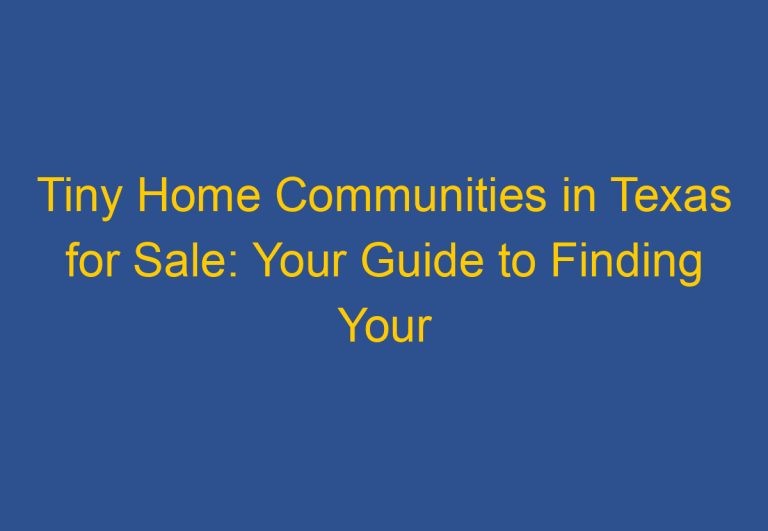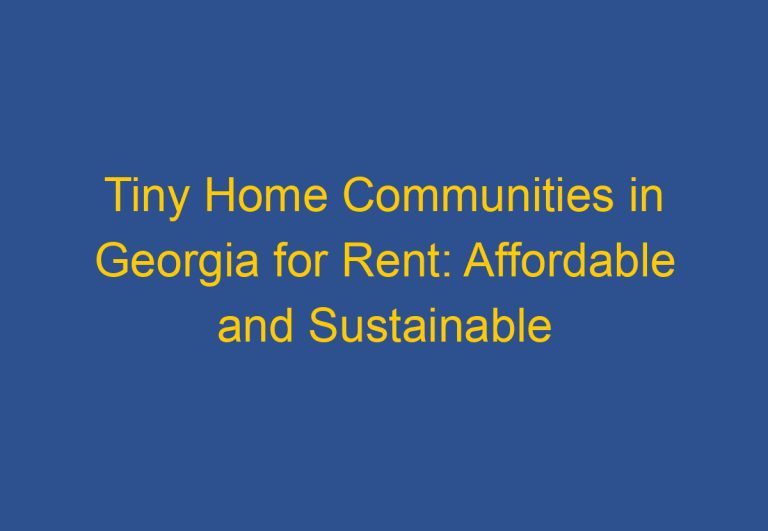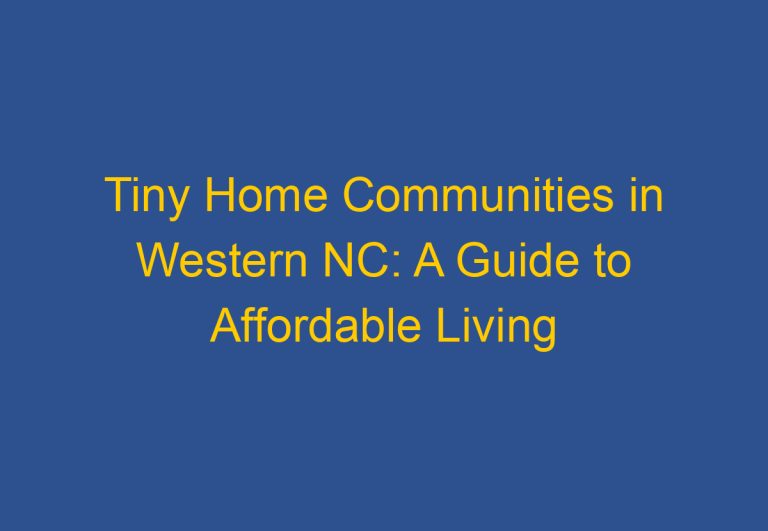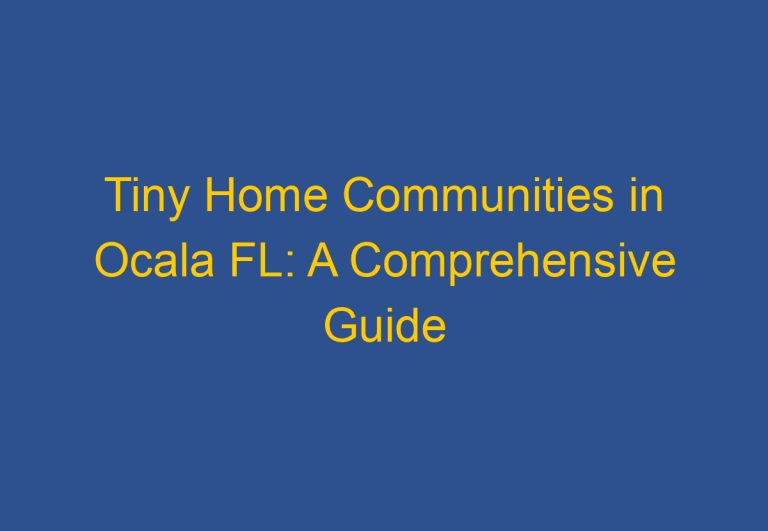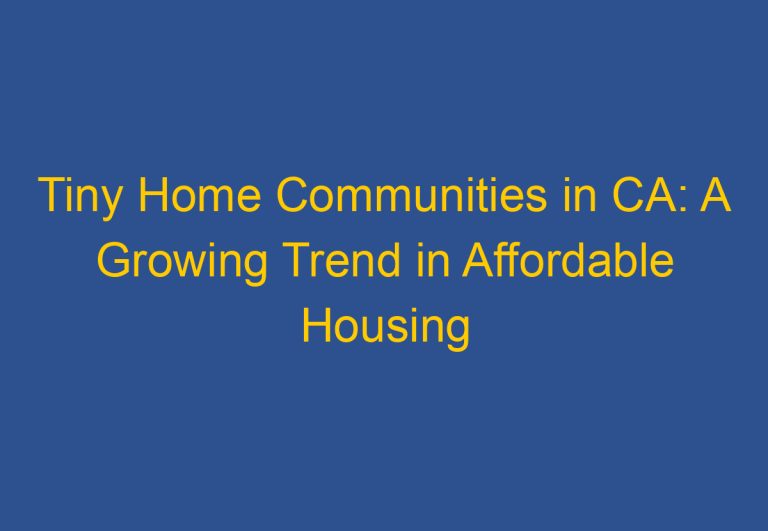Tiny Home Communities in Virginia for Sale: Your Guide to Affordable Living
Tiny home communities have become increasingly popular in recent years, offering an alternative way of living for those who want to downsize and simplify their lives. Virginia is home to several tiny home communities that offer a unique and affordable living experience. These communities are designed to foster a sense of community and provide residents with a simpler, more sustainable way of living.
For those interested in purchasing a tiny home in Virginia, there are several communities to choose from. One such community is the Floyd Tiny House Community, located in the heart of the Blue Ridge Mountains. This community offers a range of tiny homes for sale, ranging from 200 to 400 square feet. Residents of the community enjoy access to a range of amenities, including a community garden, hiking trails, and a shared community center.
Another tiny home community in Virginia is the Tiny House Estates, located in the town of Lancaster. This community offers a range of tiny homes for sale, with prices starting at around $60,000. Residents of the community enjoy access to a range of amenities, including a community garden, a shared community center, and a dog park. The community is also located just a short drive from the Chesapeake Bay, making it an ideal location for those who enjoy outdoor activities such as fishing and boating.
Understanding Tiny Home Communities in Virginia
Benefits of Tiny Home Living
Tiny home living offers several benefits, including reduced cost of living, lower energy consumption, and a simpler lifestyle. Tiny homes are often eco-friendly and energy-efficient, making them a great option for those who want to reduce their carbon footprint. Additionally, tiny home communities offer a sense of community and a chance to live in a close-knit neighborhood.
Zoning Laws and Building Codes
Before purchasing a tiny home in Virginia, it is important to understand the state’s zoning laws and building codes. In Virginia, a tiny home must have a living space between 120 and 400 square feet and must be built on land that is at least 320 square feet in area. The habitable rooms must have a minimum height of 6’8″, and at least one room must have a window and a closet. It is also important to note that tiny homes on wheels are subject to different regulations than those built on a foundation.
Types of Tiny Homes Available
There are several types of tiny homes available in Virginia, including tiny houses on wheels and those built on a foundation. Tiny houses on wheels offer the flexibility of mobility and can be moved from one location to another. On the other hand, tiny homes built on a foundation offer a more permanent living solution. Additionally, there are many different styles of tiny homes available, ranging from rustic cabins to modern, sleek designs.
In conclusion, tiny home communities in Virginia offer a unique living experience that is both sustainable and affordable. However, it is important to understand the zoning laws and building codes in Virginia before purchasing a tiny home. With the various types of tiny homes available, there is sure to be an option that fits every individual’s needs and preferences.
Features and Amenities of Virginia’s Tiny Home Communities
Virginia’s tiny home communities offer a range of features and amenities that make them attractive to those seeking a simpler, more sustainable lifestyle. In this section, we will explore some of the most common features and amenities found in Virginia’s tiny home communities.
Community Gardens and Outdoor Spaces
Many of Virginia’s tiny home communities offer community gardens and outdoor spaces, providing residents with the opportunity to grow their own food and enjoy the outdoors. These spaces often include raised garden beds, composting areas, and outdoor seating areas. Community gardens are a great way to meet and connect with other residents, as well as to learn new skills and improve your health.
Shared Facilities and Services
Virginia’s tiny home communities often offer shared facilities and services, such as laundry facilities, free Wi-Fi, BBQ facilities, and outdoor pools. These shared spaces provide residents with access to amenities that they might not be able to afford on their own, and encourage a sense of community and sharing.
Location and Accessibility
Many of Virginia’s tiny home communities are located in beautiful and natural settings, with easy access to hiking trails, fishing, and other outdoor activities. They are often located in rural areas, which provide a peaceful and quiet environment. However, it is important to consider the location and accessibility of a tiny home community before making a purchase. Some communities may be far from essential services, such as grocery stores and medical facilities, which can be a challenge for some residents.
Overall, Virginia’s tiny home communities offer a range of features and amenities that make them an attractive option for those seeking a simpler, more sustainable lifestyle. Whether you are looking for a community garden, shared facilities and services, or a beautiful natural setting, there is a tiny home community in Virginia that is right for you.
Buying a Tiny Home in Virginia
If you’re considering buying a tiny home in Virginia, there are a few things you should know before making a purchase. This section will cover costs and financing options, finding the right community, and the purchase process.
Costs and Financing Options
The cost of a tiny home in Virginia can vary depending on several factors, including location, size, and features. According to Tiny House Listings, the average price for a tiny home with land in Virginia is $262,625, with each acre priced at $23,817. However, there are several financing options available, including personal loans, RV loans, and home equity loans.
Finding the Right Community
When looking for a tiny home community in Virginia, it’s important to consider factors such as location, amenities, and lot rental fees. Some popular communities in Virginia include Lake Walk Tiny Home Community, Tiny House Estates, and Tiny House Siesta. These communities offer a range of amenities, such as community gardens, dog parks, and fitness centers.
The Purchase Process
When purchasing a tiny home in Virginia, it’s important to work with a reputable seller and to have a clear understanding of the purchase process. Tiny House Listings is a great resource for finding tiny homes for sale in Virginia. Once you’ve found a home you’re interested in, you’ll need to secure financing and work with the seller to complete the purchase. It’s also important to consider any additional costs, such as lot rental fees and utility hookups.
In conclusion, buying a tiny home in Virginia can be a great way to downsize and save money. With several financing options and a range of communities to choose from, it’s easier than ever to find the perfect tiny home for your needs.
Frequently Asked Questions
What are the best tiny home communities in Virginia?
Virginia offers a wide range of tiny home communities, each with its unique features and amenities. Some of the best tiny home communities in Virginia include the Lynchburg Tiny Home Community, the Tiny House Community at Lake Gaston, and the Escape to Blue Ridge Tiny Home Community.
How much do tiny homes cost in Virginia’s communities?
The cost of tiny homes in Virginia’s communities varies depending on the location, size, and features of the home. On average, a tiny home in Virginia’s communities can cost between $57,000 and $345,000. However, some luxury tiny homes can cost up to $119,000.
Can you find tiny home communities in Virginia that offer homes with land?
Yes, several tiny home communities in Virginia offer homes with land. For example, the Tiny House Community at Lake Gaston provides spacious lots for tiny homes, allowing residents to enjoy the outdoors and the beautiful natural surroundings.
Are there any owner-financed tiny home communities in Virginia?
Yes, some tiny home communities in Virginia offer owner-financing options. This can be a great option for individuals who may not qualify for traditional financing or who prefer to finance their tiny home directly through the community.
What are the legal requirements for living in a tiny house community in Virginia?
In Virginia, tiny homes must meet specific requirements to be considered legal dwellings. These requirements include a minimum of 120 square feet of living space, a ceiling height of at least 6’8″, and a separate bathroom with a toilet, sink, and shower or bathtub. Additionally, tiny homes must be placed on a foundation or a permanent chassis and must comply with local zoning and building codes.
Are there any repossessed tiny homes available in Virginia communities?
It is possible to find repossessed tiny homes in Virginia communities, but they are relatively rare. Individuals interested in purchasing a repossessed tiny home should keep an eye on local listings and be prepared to act quickly when a home becomes available.







